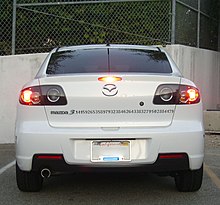This is an old revision of this page, as edited by 203.122.232.223 (talk) at 04:36, 7 May 2013 (→Geek chic). The present address (URL) is a permanent link to this revision, which may differ significantly from the current revision.
Revision as of 04:36, 7 May 2013 by 203.122.232.223 (talk) (→Geek chic)(diff) ← Previous revision | Latest revision (diff) | Newer revision → (diff) This article is about the term geek itself, as well as the modern meaning. For the circus performer, see Geek show. For the 1971 film, see The Geek. For the 2004 film, see Geeks (film).| This article needs additional citations for verification. Please help improve this article by adding citations to reliable sources. Unsourced material may be challenged and removed. Find sources: "Geek" – news · newspapers · books · scholar · JSTOR (August 2012) (Learn how and when to remove this message) |

The word geek is a slang term for odd or non-mainstream people, with different connotations ranging from "a computer expert or enthusiast" to "a person heavily interested in a hobby", with a general pejorative meaning of "a peculiar or otherwise dislikable person, esp one who is perceived to be overly intellectual".
Although often considered as a pejorative, the term is also often used self-referentially without malice or as a source of pride.
Etymology
This word comes from English dialect geek, geck: fool, freak; from Low German geck, from Middle Low German. The root geck still survives in Dutch and Afrikaans gek: crazy, as well as some German dialects, and in the Alsatian word Gickeleshut: geek's hat, used in carnivals. The Swedish transitive verb gäcka (to outsmart, to fool) has the same root; att gäcka rättvisan (to escape justice by clever tricks) is a set expression.
Formerly, in 18th century Austria-Hungary, Gecken were freaks shown by some circuses. In 19th century, in North-America, the term geek referred to a freak in circus side-shows (see also freak show). The 1976 edition of the American Heritage Dictionary included only the definition regarding geek shows.
The word appears in the modern sense of a science, math, or technology enthusiast in Robert Heinlein's 1952 short story "The Year of the Jackpot".
Definitions
The definition of geek has changed considerably over time, and there is no longer a definitive meaning. The term nerd has a similar, practically synonymous meaning as geek, but many choose to identify different connotations among these two terms, although the differences are disputed. In a 2007 interview on The Colbert Report, Richard Clarke said the difference between nerds and geeks is "geeks get it done."(or "ggid", which only a certified geek would point out) Julie Smith defined a geek as "a bright young man turned inward, poorly socialized, who felt so little kinship with his own planet that he routinely traveled to the ones invented by his favorite authors, who thought of that secret, dreamy place his computer took him to as cyberspace—somewhere exciting, a place more real than his own life, a land he could conquer, not a drab teenager's room in his parents' house."
An acronym G.E.E.K also contributed to the word's connotation to technology savvy people. Geek used in this context was popularized in the US army and denotes "General electrical engineering knowledge".
There are many subclassifications in geeks like the following: Science geeks, Math geeks, Computer geeks, History geeks, Engineering geeks, Language geeks, Sci-Fi geeks, Fantasy geeks, Comic Book geeks, Video Game geeks, Board Game geeks, Trading Card geeks, Music geeks, and even Sports geeks.
Geek chic
Self-application
See also
- Anorak and Boffin, British slang for "geek"
- Akiba-kei and Otaku, Japanese slang for "geek"
- Autodidactism
- Behavior
- Enthusiast
- Fantasy prone personality
- Geek Code
- Geek girl
- Geekcorps
- Nerd
- Norm (sociology)
- Technosexual
- Girl Geek Dinners
- Asperger's Syndrome sometimes produces personality traits that overlap with some of the modern definitions of geek.
References
- ^ "Geek". Dictionary.com-Merriam-Webster entry. Retrieved 2007-10-12.
- "Geek". Online Etymology Dictionary. Retrieved 2013-05-03.
- The Colbert Report 17th of January video interview Richard Clarke
- Reconstruction 6.1 (Winter 2006)
- http://www.wisegeek.com/what-is-a-geek.htm
External links
- Geek Culture: The Third Counter-Culture, an article discussing geek culture as a new kind of counter-culture.
- Hoevel, Ann. "Are you a nerd or a geek?" CNN. December 2, 2010.
- "Geek Chic", USA Today, October 22, 2003
- "How Geek Chic Works"